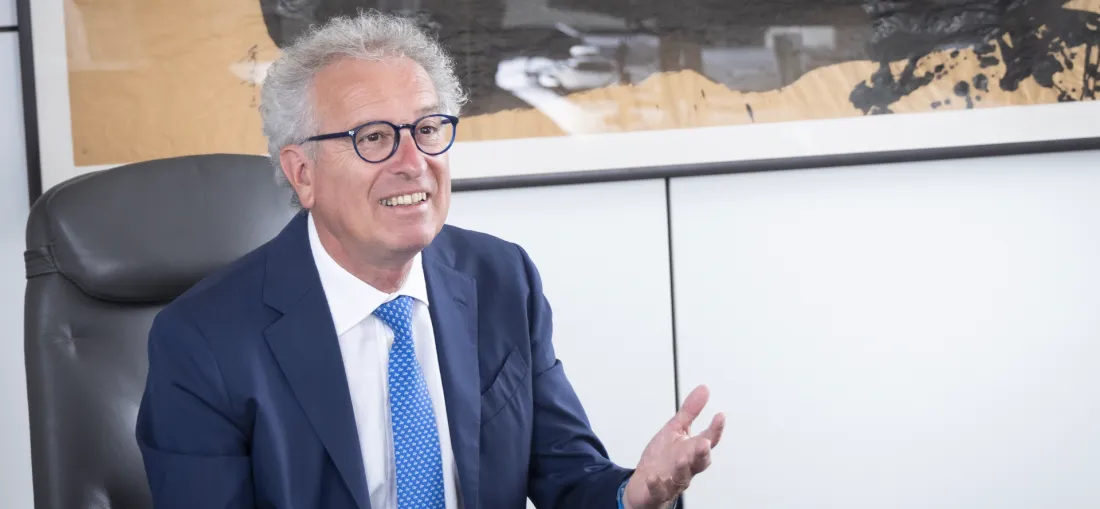Pierre Gramegna in interview with AFP

Pierre Gramegna, ESM Managing Director
Interview with Agence France Presse
5 July 2025
Interviewer: Martine Pauwels
Original language: French
AFP: What is your view of Europe's economic situation compared to the United States?
Pierre Gramegna: You can see the glass as half-full or half-empty. I would first point out that despite the decline in international trade due to geopolitical tensions, the war in Ukraine and all the efforts that had to be made because of the energy crisis, Europe has seen growth, albeit weak, but growth nonetheless, slightly below 1% for the past three years.
But where the glass is half-empty is that Europe's growth rate has been half that of the United States over the last few years. (…) This obviously puts us at a disadvantage. With weak growth, it is much more difficult to generate tax revenues and, at the same time, much more difficult to meet spending challenges, particularly in the military sector. Europe needs more growth to stabilise public deficits and bring them into line with the Stability and Growth Pact.
What risks does the EU face in this context?
(There are) potential risks of financial instability. With the latest NATO decisions requiring European countries to spend 5% of their GDP on defence and logistics, this represents a huge additional expense. This will therefore put pressure on national budgets.
We are, of course, obliged to comply with the Stability and Growth Pact. Should there be any risk of slippage, the European Stability Mechanism is there as a last resort if countries encounter difficulties in financing themselves on the financial markets.
How can the EU stimulate growth?
It is futile to think that we can go back to what we have known since the Second World War, i.e. an order that promotes international cooperation and multilateralism, respect for treaties, the rule of law and increasing global trade. (...) We must therefore adjust to the world as it is changing, whether we Europeans like it or not.
In this context, it is essential that we focus on what is in our own hands. (…) Enrico Letta's report on the single market and Mario Draghi's report on competitiveness (…) provide us with a whole range of ideas. We need to invest more in innovation: Mario Draghi is talking about €800 billion per year (of which) 75% to 80% is private investment – governments cannot finance everything. It is this gap in innovation and investment that explains the growth gap with the United States and other countries.
And the single market?
The single market is one of the European Union's greatest achievements since its creation, along with the creation of the euro. However, the single market was negotiated in the 1980s and came into being in 1993, when there was no digital economy or artificial intelligence, and goods played a more important role than services. It is only natural that it should be modernised.
Are you calling for savings to be mobilised?
In some areas, we still have highly fragmented markets. For example, we have 27 capital markets: when an American or Chinese investor looks at Europe, they need to be familiar with the legal system or specific features of 27 countries. This is particularly noticeable and visible in the financial area, and it puts us at a disadvantage compared to the rest of the world.
We have accumulated huge private savings of €33 trillion, most of which is invested outside Europe. We therefore need to create a savings and investments union and try to channel our savings, which are the highest in the world, towards productive investments on our continent (for example) in the pharmaceutical or high-tech sectors.
What initiatives has the Commission already taken?
Over the last few months, the Commission has taken action (...) realising that we need to simplify our rules, that we have gone too far with regulation and that data management, reporting requirements and constraints are such that they are becoming unmanageable for SMEs and even for large companies. The first Omnibus Directive has been proposed, and we must continue in this direction.
It has also tabled a directive on securitisation, which did not receive good press because of the excesses that occurred during the 2008-2009 financial crisis. But regulation goes so far that it cannot be understood and used.
Could the ESM have a role to play in a possible European Defence Mechanism?
When the Commission published its report on defence a few months ago, it proposed a €150 billion loan mechanism that certain countries could access. If this amount proves insufficient, it says that we could consider the role the ESM could play, (...) which was created to ensure the financial stability of the euro area and thus prevent contagion that could result from the weakness of one or more Member States.
If military spending constraints were to create risks to financial stability in any country, that is exactly the kind of situation for which the ESM exists.
I hear many voices saying that joint European funding is needed in the military field. That is putting the cart before the horse. It is better to first agree on joint projects – these could be tanks, aircraft or a missile defence shield.
What is your response to China's threat to tax imports of French cognac?
So far, the European Commission has acted in an extremely responsible and skillful manner in the creeping trade war that surrounds us. First, by trying to negotiate with the United States (...) to avoid escalation. We must stick to this strategy to show our good faith. You mentioned the example of cognac, but tomorrow there may be an example that particularly affects another European Union country: we must find common responses that avoid escalation.
Author

Contacts


